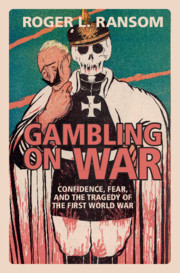'World War I became a tragedy when victory became an end in itself rather than a means of achieving some prewar objective. In his lucid and insightful Gambling on War, Roger L. Ransom draws on history and economics to explain why that happened, why World War I upended the world’s institutions, and why its tragic effects persist even today.'
Philip T. Hoffman - author of Why Did Europe Conquer the World?
'The First World War remains with us. Ransom, an economic historian, places it within an age of extremes that ran from Bismarck to Clemenceau. The war resolved no rivalries. It led to no new normalcy. The book jars the reader into that reality. It shocks. It angers. It is a must-read.'
Holger H. Herwig - author of The First World War: Germany and Austria-Hungary 1914–1918
'Economists think of people as rational but this is belied by experience. From that perspective, economic historian Roger L. Ransom shows persuasively how over-confidence, fear and reckless gambles make sense of a sequence of bad decisions that led to the First World War, and to catastrophic outcomes that nobody planned for.'
Avner Offer - author of The First World War: An Agrarian Interpretation
'The general interest reader learns a lot, and about many things. … a great read for general interest readers with a standard background in economics … It should also have its place as a core reading for an undergraduate course on the economics of war.'
Victor Gay
Source: EH.Net
'The great strength of the book is the application of behavioral economic theories to decision-making in the First World War. It offers a variation on the argument that the war swept away the restrained political mores of the late nineteenth century. Once one power 'speculated' by initiating aggression, others had to react, and this changed expectations of future behavior, creating a path dependency toward the Second World War.’
William Mulligan
Source: H-Diplo





